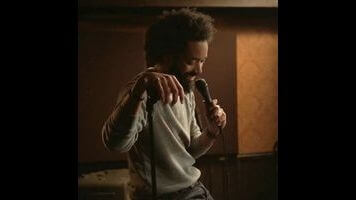The first shot we see of Wyatt Cenac is him backstage, hunched over and deep in thought. It’s an appropriate image to introduce the comedian, not only because it matches his on-stage persona, but also because it prepares the audience for the tenor of his set—reflective, sincere, and personal. Wyatt Cenac: Brooklyn, the comedian’s second stand-up special, was filmed in Brooklyn’s Union Hall, an intimate setting that naturally fits Cenac’s comedic style. While Cenac’s subtle delivery enlivened general observational humor about cat videos and Medieval Times, his first special, Wyatt Cenac: Comedy Person, had to go bigger and broader to match the huge space of the venue. Cenac appears more comfortable in Brooklyn’s smaller setting, and it affords him the opportunity to delve into more distinctive material.
As the title suggests, the majority of the material in Brooklyn focuses on life in New York City. While some may be automatically turned off by the region-centric comedy, neither Cenac nor the material come off exclusionary, even when he’s discussing the differences between Crown Heights and Fort Greene. The shots of Brooklyn that bookend the special actually invite the audience into both Cenac’s backyard and his worldview. Besides, Cenac’s regional humor produces some of his best, funniest insights on a variety of issues, such as his problems with gentrification and his personal experiences growing up in Brooklyn. The special also contains one of his best bits, about the awkwardness of engaging with a doorman his own age and race: “I’ll tell you a little secret about black dudes in their 30s: We don’t respect each other.”
Cenac’s attentive, inquisitive perspective also allows him to engage with darker material. When Cenac begins to talk about cab-driver etiquette, he comfortably segues into the subject of his father, a New York City cab driver who was shot and killed on the job. He doesn’t force levity onto the subject nor make cheap jokes to comfort the audience; instead, he finds humor in comparing his reaction to the event as an adult to his reaction as a child. It illustrates Cenac’s command over the audience that he can guide them through more serious territory without losing an inch of ground, and it also separates him from numerous comedians whose style or focus don’t allow such versatility.
Cenac confidently meanders between topics, and the set benefits from a loose structure, but the pacing sometimes dips to a crawl. Cenac’s measured delivery precludes wall-to-wall quips and jokes, but there are times in Brooklyn when it feels like Cenac is just talking to talk, especially when the back half of the set leaves the specificity of New York life to touch on the comic’s own daily experiences. Cenac’s voice is compelling enough to ride through some of the duller sections, but it’s hard to shake the feeling that something is being lost in translation—parts of the special likely worked better at Union Hall than they do on Netflix.
Cenac, who also directs the special, compensates for this stage-to-streaming transition in a strange way: Occasionally during the set, the camera will zoom out and place puppets in the foreground to act out some of Cenac’s bits. The puppeteering is good, and the vignettes are cute, but it’s not that visually exciting and it mostly serves as a distraction from the main show. It’s also somewhat disappointing because the filmmaking itself is otherwise successful. Cenac uses the entire space to capture his performance, filming from both the stage and the audience, and it succeeds in illustrating the intimacy of the setting. His choice to break up the performance otherwise reads as a nervous attempt to appeal to the people watching at home.
But the fact that Brooklyn is premiering on Netflix illustrates something wonderful about the service: It’s clearly providing opportunities for comedians to be themselves without the burden of trying to reach a mainstream audience. It’s doubtful that Comedy Central would air Brooklyn—because of the fear that it won’t reach a wide audience—but Cenac has a streaming option, and it allows him to stay true to the integrity of his perspective and vision. In that sense, Brooklyn is a complete success. No one but Cenac could have performed this material in this way, and that’s something worth watching.

